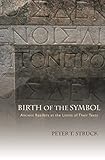Birth of the Symbol : Ancient Readers at the Limits of Their Texts / Peter T. Struck.
Material type: TextPublisher: Princeton, NJ : Princeton University Press, [2009]Copyright date: ©2004Edition: Course BookDescription: 1 online resource (312 p.)Content type:
TextPublisher: Princeton, NJ : Princeton University Press, [2009]Copyright date: ©2004Edition: Course BookDescription: 1 online resource (312 p.)Content type: - 9780691162263
- 9781400826094
- online - DeGruyter
- Issued also in print.
| Item type | Current library | Call number | URL | Status | Notes | Barcode | |
|---|---|---|---|---|---|---|---|
 eBook
eBook
|
Biblioteca "Angelicum" Pont. Univ. S.Tommaso d'Aquino Nuvola online | online - DeGruyter (Browse shelf(Opens below)) | Online access | Not for loan (Accesso limitato) | Accesso per gli utenti autorizzati / Access for authorized users | (dgr)9781400826094 |
Browsing Biblioteca "Angelicum" Pont. Univ. S.Tommaso d'Aquino shelves, Shelving location: Nuvola online Close shelf browser (Hides shelf browser)

|

|

|

|

|

|

|
||
| online - DeGruyter The Reasons of Love / | online - DeGruyter The Good in the Right : A Theory of Intuition and Intrinsic Value / | online - DeGruyter Happy Lives and the Highest Good : An Essay on Aristotle's Nicomachean Ethics / | online - DeGruyter Birth of the Symbol : Ancient Readers at the Limits of Their Texts / | online - DeGruyter The Reemergence of Self-Employment : A Comparative Study of Self-Employment Dynamics and Social Inequality / | online - DeGruyter Colormute : Race Talk Dilemmas in an American School / | online - DeGruyter Lambent Traces : Franz Kafka / |
Frontmatter -- CONTENTS -- ACKNOWLEDGMENTS -- Introduction. The Genealogy of the Symbolic -- 1. Symbols and Riddles: Allegorical Reading and the Boundaries of the Text -- 2. Beginnings to 300 B.C.E.: Meaning from the Void of Chance and the Silence Of The Secret -- 3. From the Head of Zeus: The Birth of the Literary Symbol -- 4. Swallowed Children and Bound Gods: The Diffusion of The Literary Symbol -- 5. 300 B.C.E.-200 C.E.: The Symbol as Ontological Signifier -- 6. Iamblichus and the Defense of Ritual: Talismanic Symbols -- 7 Moonstones and Men that Glow: Proclus and the Talismanic Signifier -- Epilogue. Symbol Traces: Post-Proclean Theories -- Appendix. Chrysippus'S Reading and Authorial Intention: The Case of the Mural at Samos -- Bibliography Of Ancient Authors -- Bibliography Of Modern Authors -- Index Locorum -- General Index
restricted access online access with authorization star
http://purl.org/coar/access_right/c_16ec
Nearly all of us have studied poetry and been taught to look for the symbolic as well as literal meaning of the text. Is this the way the ancients saw poetry? In Birth of the Symbol, Peter Struck explores the ancient Greek literary critics and theorists who invented the idea of the poetic "symbol." The book notes that Aristotle and his followers did not discuss the use of poetic symbolism. Rather, a different group of Greek thinkers--the allegorists--were the first to develop the notion. Struck extensively revisits the work of the great allegorists, which has been underappreciated. He links their interest in symbolism to the importance of divination and magic in ancient times, and he demonstrates how important symbolism became when they thought about religion and philosophy. "They see the whole of great poetic language as deeply figurative," he writes, "with the potential always, even in the most mundane details, to be freighted with hidden messages." Birth of the Symbol offers a new understanding of the role of poetry in the life of ideas in ancient Greece. Moreover, it demonstrates a connection between the way we understand poetry and the way it was understood by important thinkers in ancient times.
Issued also in print.
Mode of access: Internet via World Wide Web.
In English.
Description based on online resource; title from PDF title page (publisher's Web site, viewed 29. Jul 2021)


